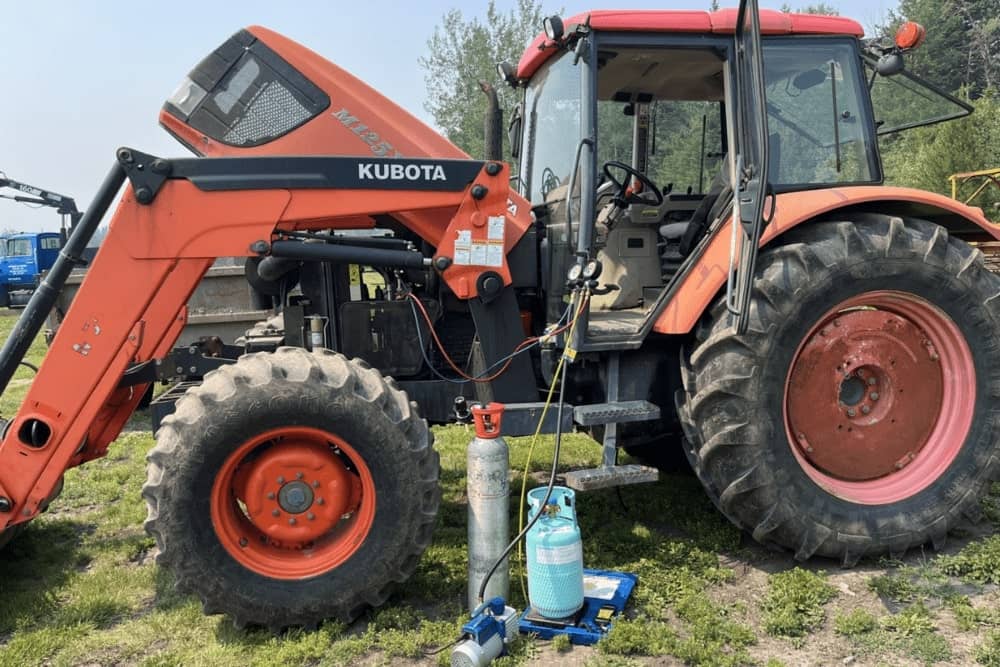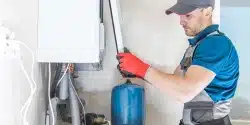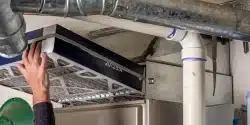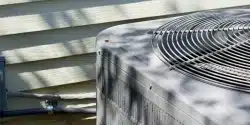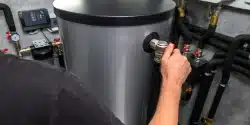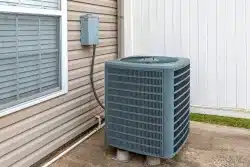Heavy Equipment A/C Repairs in the Okanagan
Heavy equipment, vital in construction, mining, and agriculture, operates in some of the most challenging environments. Maintaining a comfortable cab temperature is crucial for operator comfort, safety, and efficiency. This guide offers comprehensive insights into the maintenance and repair of air conditioning systems in heavy equipment, ensuring that these essential machines keep running smoothly, even in the harshest conditions.
Understanding the AC System in Heavy Equipment
Heavy equipment AC systems are robustly designed to endure the rigours of extreme environments, from construction sites to mining operations. Understanding key components’ roles and their challenges is vital for effective maintenance and troubleshooting.
- Compressor: The compressor is the heart of the AC system. It compresses the refrigerant, raising its temperature and pressure. In heavy equipment, compressors must endure constant vibrations and extreme temperature fluctuations. Watch for unusual noises or reduced cooling efficiency, indicating compressor wear or failure.
- Condenser: The condenser cools the high-pressure refrigerant gas, turning it back into a liquid. It’s often exposed to external elements like dust and debris, making it susceptible to blockages and reduced efficiency. A clogged or malfunctioning condenser can lead to overheating and system failure.
- Evaporator: Located inside the cabin, the evaporator absorbs heat from the air, cooling the cabin environment. It’s prone to accumulating dust and debris, impeding airflow and cooling effectiveness. Foul odours or decreased cooling efficiency are common signs of issues with the evaporator.
- Refrigerant System: The refrigerant system circulates the refrigerant through the AC system. Leaks in this system are a common issue in heavy equipment, leading to a loss of cooling capability. Signs of a refrigerant leak include visible residue on AC components, hissing sounds, or a noticeable decrease in cooling.
Regular Maintenance Tips for Heavy Equipment AC
Regular AC system maintenance is crucial for operational efficiency and longevity for heavy equipment.
- Clean or Replace Filters: The cabin air filters can become clogged with dust and debris, especially in heavy-duty environments. Regularly cleaning or replacing these filters is essential to maintain airflow and cooling efficiency.
- Check Refrigerant Levels: Low refrigerant levels commonly cause reduced cooling efficiency. Regular checks are necessary to ensure adequate refrigerant levels. However, adding or handling refrigerants requires professional expertise due to environmental and safety regulations.
- Inspect Belts and Hoses: AC system belts and hoses can become worn or damaged due to the harsh operating conditions. Regular inspection for cracks, leaks, or signs of wear is vital. Replacing them as needed helps prevent breakdowns.
- Ensure Compressor and Condenser Cleanliness: Keep the compressor and condenser debris-free. Dust, dirt, and leaves can obstruct the condenser, impacting its ability to dissipate heat effectively. Cleaning these components regularly is crucial.
- System Check-ups: Perform routine system check-ups, especially before peak usage seasons. This includes checking all electrical connections, ensuring the thermostat works correctly, and that all moving parts are adequately lubricated.
- Professional Inspections: Despite routine maintenance, annual inspections by a professional are recommended. They can identify issues that are not easily noticeable and ensure the system functions optimally.
Regular maintenance of the AC system in heavy equipment is about comfort and ensuring the machinery operates efficiently and safely. By adhering to these maintenance tips, you can significantly extend the life of the AC system and avoid costly downtime and repairs.
Troubleshooting Common AC Problems in Heavy Machinery
Heavy machinery operates under demanding conditions, and its air conditioning system is no exception. Being familiar with common AC problems and their troubleshooting can save time and prevent significant downtimes.
- Reduced Cooling Efficiency: This is often the most noticeable sign of AC trouble in heavy equipment. The first step in troubleshooting is to check the refrigerant levels; low levels frequently indicate a leak. Also, inspect the condenser for any blockages and ensure the evaporator is not clogged with debris. If these components are clean and the problem persists, the issue might be with the compressor or an internal system fault.
- Strange Noises: If the AC system starts making unusual noises, it could indicate various issues. Rattling noises might suggest loose components, while squealing could indicate a belt problem. Grinding or grumbling noises might point to a failing compressor. Initially, inspect for any loose parts or belts that can be tightened. A professional evaluation is recommended if the noise comes from the compressor.
- Leaks: AC leaks in heavy machinery can be a bit more challenging to diagnose due to the size and complexity of the systems. Visible signs of leaks include oil stains around AC components or pooling of liquids. Leaks reduce the system’s efficiency and can lead to significant damage if left unchecked. Due to environmental and safety concerns, it’s best to consult a professional for refrigerant leaks.
In-house resolution is feasible when a problem can be identified and is within the operator’s skill set, such as replacing a clogged filter or tightening a loose belt. However, if the issue is not readily apparent or involves critical components like the compressor, professional diagnosis and repair are advisable.
The Importance of Professional Inspections and Repairs
While operators or in-house mechanics can perform routine maintenance, specific problems in heavy machinery AC systems necessitate professional intervention.
- Expertise and Experience: Professionals bring specialized knowledge and experience, which is particularly important for complex systems in heavy machinery. They are equipped to handle various issues, from electrical faults to deep mechanical repairs.
- Complex Refrigerant Handling: Handling refrigerants requires specific skills and knowledge, especially considering environmental regulations. Professionals are trained in safe and environmentally compliant refrigerant handling, including proper recovery, recycling, or disposal.
- Advanced Diagnostic Tools: Professional technicians have access to advanced diagnostic tools that can accurately identify problems that are not immediately apparent. This precise diagnosis is crucial for effective repair and to prevent recurring issues.
- Warranty and Reliability: Many professional repair services offer a warranty on their work. This provides peace of mind and ensures the reliability and long-term effectiveness of the repairs.
- Cost-Effectiveness: While professional services incur costs, they can be more cost-effective in the long run. Accurate diagnostics and repairs prevent recurring problems and potential system failures, which can be far more costly.
While routine checks and minor repairs can often be managed in-house, the complexity of heavy machinery AC systems means that specific issues are best left to professionals. Their expertise ensures that repairs are thorough, comply with safety and environmental standards, and are reliable for the demanding conditions under which heavy machinery operates.
Working with Kelowna HVAC Experts: Husky Heating and Cooling
As we conclude this guide on maintaining and repairing heavy equipment A/C systems, it’s essential to recognize the role of professional HVAC services in ensuring the longevity and efficiency of these systems. In the Kelowna region, Husky Heating and Cooling stands out as a beacon of excellence in air conditioning for heavy equipment and tractors.
Husky Heating and Cooling, rooted in the heart of Kelowna, has established itself as a leader in the field of HVAC services. Their commitment to providing professional, honest, and ethical services has made them a preferred choice for residential and commercial Okanagan clients. This commitment goes beyond mere words; it is evident in every aspect of their operations, from customer interactions to the technical execution of their services.
One of the critical strengths of Husky Heating and Cooling is its comprehensive range of HVAC solutions. Whether a minor repair or a central installation, their team of skilled technicians is equipped to handle any challenge. This versatility is particularly beneficial for clients with heavy equipment, as these systems often require a specialized skill set to address their unique AC repair and maintenance needs.
Husky Heating and Cooling’s ability to tackle any HVAC problem, regardless of size, is backed by their team’s extensive training and experience. Their technicians are adept in traditional HVAC systems and continually update their skills to keep pace with the latest technologies and industry standards. This ensures they can provide the most efficient, effective, and environmentally friendly solutions.
The company’s dedication to exceeding customer expectations is another cornerstone of its success. Understanding that each client has unique needs, they tailor their services to provide the most appropriate and practical solutions. This customer-centric approach, combined with

